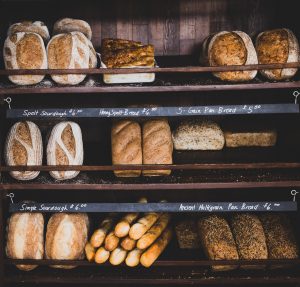 If you’re focusing on a low carb diet or think that gluten is the enemy, you might want to go grain free. While eating high volumes of processed flour isn’t good for you, choosing good alternatives can provide benefits. Grain also can create problems, such as being hard to digest. They’re seeds and seeds were meant to be tough to digest and go through the digestive system unscathed. Plants are propagated by birds and animals eating the fruit of the plant and then dropping seeds—grain—in their waste.
If you’re focusing on a low carb diet or think that gluten is the enemy, you might want to go grain free. While eating high volumes of processed flour isn’t good for you, choosing good alternatives can provide benefits. Grain also can create problems, such as being hard to digest. They’re seeds and seeds were meant to be tough to digest and go through the digestive system unscathed. Plants are propagated by birds and animals eating the fruit of the plant and then dropping seeds—grain—in their waste.
Grains supply energy, but not all grain is created nutritionally equal.
While grain can supply important nutrients and energy, there’s a big difference between whole grain and refined grain. Whole grain has all three parts, bran, germ and endosperm. The bran provides fiber and the germ has the nutrients, like vitamins, minerals and proteins. The endosperm, which is part of the whole grain and all that’s left in refined grain, has a bit of protein and the rest is carbohydrates. You’ll get extra calories, but no extra nutrients with refined grains. Even some labels touting whole grain are mostly refined flour with a little whole grain added. Be aware and read the ingredient list.
No matter what type of grain you eat, the protein in the grain is hard to break down.
The protein in grain is a complex protein, that makes it more difficult to digest. The simpler the food, the easier it is to digest. For example, a simple carb, such as sugar, breaks down quickly, while a complex carb takes longer. The gluten in grain is complex, which makes it hard to digest. Gluten has increased in modern grain. Consider going to ancient grains to reduce gluten. Some grains or grain substitutes, such as amaranth, barley, brown rice, quinoa, sorghum, rye and whole oats, even have anti-inflammatory properties.
You need enzymes for digestion. Some grains block digestion.
Plants need good conditions to grow, so they contain an enzyme inhibitor to prevent germination unless there’s adequate water and the right conditions. That helps them to continue the species. These enzyme inhibitors can play havoc in our body, however. That’s because the body requires enzymes for digestion. The enzyme inhibitors in grains can create digestive problems.
- Grains contain phytic acid, which can affect the absorption of minerals in the small intestine if there’s too much in your body. Too much phytic acid is often considered a cause of leaky gut syndrome.
- When prepared properly, much of the phytic acid and disaccharides that are hard to digest are removed from grains. Fermenting, soaking and sprouting makes them easier to digest and reduce the phytic acid.
- If you’re having digestive problems, one of the easiest ways to identify the offender is an elimination diet. Switch to a bland diet and slowly add food back into it. If you find yourself ill when you add grain, it’s time to go grain free.
- Whether you choose to go grain free or not, use the best type of grain possible. Focus on using whole grains and ancient grains or grain substitutes like amaranth. You’ll get more nutrients and have fewer problems.
For more information, contact us today at LIV Fitness 247
